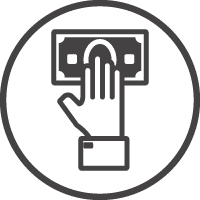Debt Settlement Services
United Settlement offers professional debt settlement services that help you negotiate lower payoff amounts with creditors. Our licensed specialists work to reduce unsecured debt for less than you owe, helping you avoid bankruptcy and regain financial control. With our no-settlement, no-fee policy, you only pay after a successful negotiation.
Table Of Contents
Types of Debts Eligible for Settlement
How Our Debt Settlement Services Work
Our debt settlement process starts with a free evaluation to determine if it’s the right debt management solution for you. Our team reviews your debts, income, and goals before developing a customized strategy that you’ll review and approve.
Once enrolled, you’ll make a single monthly deposit into a dedicated account that will be distributed to your creditors. And in the meantime, our licensed professionals will work with creditors on your behalf to negotiate reduced lump-sum settlements based on your budget. Throughout the debt settlement process, you can view progress through a secure client portal until all enrolled accounts are resolved and you conclude the program.


Who Debt Settlement Is For
Debt settlement is for individuals who are struggling to pay off significant unsecured debts, such as credit cards, personal loans, and medical bills. It can be a good idea for those who are already behind on payments, who aren’t making a dent in their balances with minimum payments, and who want to avoid bankruptcy. If you feel buried in debt that you can’t afford to pay back, even at a lower interest rate, our professional debt settlement services could be a solution to getting back on track.
Benefits of Using Debt Settlement Services
Professional debt settlement services can lower your total balances, simplify repayment with a single monthly deposit, and stop collection efforts once accounts are settled. Our experts handle negotiations directly with creditors to help you resolve debts faster and reduce financial stress.
When to Consider Debt Settlement Services
Debt settlement may be appropriate when unsecured debt has become unmanageable and other solutions, like consolidation or credit counseling, are no longer viable. It can be a strategic option to regain control when you cannot maintain minimum payments.
What to Look for in a Debt Settlement Company
When selecting a debt settlement company to work with, look for a provider with licensed professionals, transparent fees, and a clear explanation of how your funds are handled. Be wary of upfront fees and unrealistic promises while prioritizing straightforward communication, detailed disclosures, and results based on approved settlements. United Settlement offers a no-settlement, no-fee model with full transparency and proven results.

Why United Settlement for Debt Settlement Services?
United Settlement combines experience, integrity, and proven results with a team of more than 100 licensed professionals. We’ve helped over 20,000 clients reduce unsecured debt through personalized programs, backed by thousands of five-star reviews. With us, you only pay after successful negotiation, which is part of what makes us the best debt settlement services for many individuals looking for reliable, trustworthy, and transparent support.
Debt Settlement Resources

Credit Cards And Your Credit
Debt Settlement FAQ
Debt settlement remains on a credit report for seven years. Settling an account for less than the full balance owed is considered potentially negative, as it implies that a debtor did not repay the entire debt as stipulated under the terms of the original contract. Though large settlements will have a proportionate negative impact upon a credit score and profile, it is possible that the settlement of small balances will have a negligible negative effect, particularly when an individual is current on other larger loans.
A written debt settlement proposal letter should be both formal and clear – it must include all identifying information related to your name, address, account number and balance owed, so that a creditor can quickly access your account and cross-reference it with your letter. The letter should describe the circumstances that prevent you from paying in full, along with an offer to pay a specified amount upon acceptance of the offer.
Negotiating debt settlement yourself can be a lengthy process, but it is something that you should try to complete as quickly as possible. The key to effective debt settlement is possessing the financial ability to settle. Therefore, if you have the means, you should begin saving for an eventual lump sum payment or structured payment schedule that can be completed within two years from initiation. Either you or a settlement company must assess your financial situation and determine how much you can save each month toward your eventual settlement. A good settlement company will approximate how much you will ultimately need following a specific review of your creditors and a determination as to which of them may be potentially legally aggressive. You also must generate a hierarchy of creditors – who to settle with first, and at what percentage – followed by the next creditor and percentage, and so forth, through your entire sequence of creditors. You also must manage all communications with your creditors. Accordingly, you must formulate a strategy of how to best submit settlement offers that paint your situation in the most advantageous possible light and that provides creditors with proper incentive to settle with you.
Yes, debt settlement programs can hurt your credit since you stop making payments during negotiations. However, for many, it’s a short-term disadvantage that supports long-term financial success. Since debt settlement often follows a period of several months of non-payment on accounts, any delinquencies will have already impacted a score negatively. Ironically, when debt settlement is made on accounts in good standing, a credit score will be more negatively impacted, since there haven’t been any black marks that have previously weakened the score. Credit scores are designed to measure an individual’s ability to pay debt balances back in full, and since debt settlement implies an inability to pay balances back in full, it makes sense that debt settlement will have a negative impact on a credit score, particularly when larger settlement amounts are involved.
The question of which is better, debt consolidation or debt settlement, is completely dependent upon circumstances. Debt settlement makes more sense when dealing with accounts that are already seriously delinquent – in these instances, much of the damage to a credit score has already been incurred, and although a debt settlement will remain on a credit report for seven years, the prospect of paying less than the full amount owed could be worth the stain, particularly when the account is no longer in good standing. Debt Consolidation makes sense for individuals who can simplify the repayment process by paying off a number of balances through the proceeds of a debt consolidation loan that is often taken out an overall lower blended interest rate, thereby saving money on interest expense while also usually lowering the monthly payment.
A debt settlement program is a structured plan where a company negotiates with your creditors to accept less than the full balance on eligible unsecured accounts. You make one monthly deposit into a specific account that will be used to pay off your balances when a settlement is reached.
By negotiating reduced balances, a debt settlement service may help you pay less overall. However, results vary based on your financial hardship, ability to make regular deposits, and creditor participation.
Programs typically last 24–48 months, depending on total debt and monthly deposit amounts. A projected timeline is provided during your consultation and updated throughout the program.
Debt settlement may be a good choice if you have significant unsecured debt, are facing a hardship, and want to avoid bankruptcy. It provides a structured approach to becoming debt-free, often at a lower overall cost and with the help of professionals.
Many people find that debt settlement is worth it, especially when high interest and late fees make progress feel impossible. The process provides a clear path to resolution, reduced stress, and one predictable monthly deposit.
Typical candidates for debt settlement services include individuals with unsecured debts, such as credit card or medical bills, who are facing financial hardship but can make a consistent monthly payment.
United Settlement only charges fees after a successful settlement has been negotiated and approved by you. All fees are disclosed in writing before enrollment, so you always understand costs before any payment is made.
Top Videos Related to Debt Settlement
Debt Settlement
Get debt relief for unsecured loans. Debt settlement occurs when a debtor successfully negotiates a payoff amount for less than the total balance owed
Debt Settlement vs Bankruptcy
The processes of debt settlement and filing for bankruptcy represent two viable alternatives for an individual buried under insurmountable debt.
Debt Consolidation
Debt consolidation loans combine all credit card debts into one monthly payment. Decrease the chance of submitting late payments with a debt management plan.
Master Your Finances:
Our Latest Insights & Articles





















